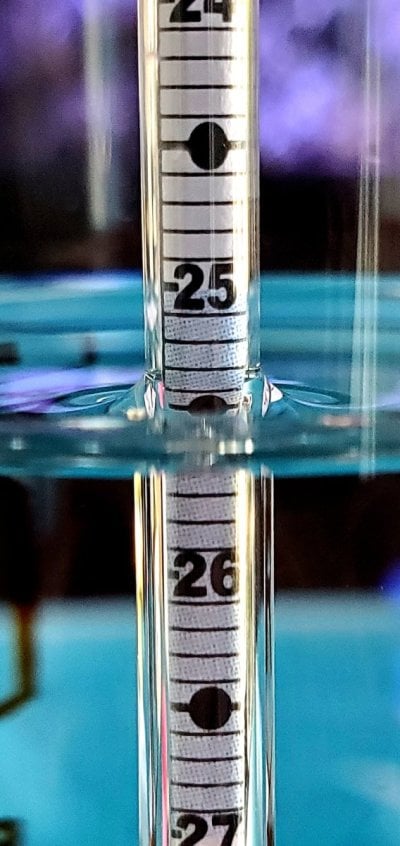Navigation
Install the app
How to install the app on iOS
Follow along with the video below to see how to install our site as a web app on your home screen.
Note: This feature may not be available in some browsers.
More options
You are using an out of date browser. It may not display this or other websites correctly.
You should upgrade or use an alternative browser.
You should upgrade or use an alternative browser.
Salinity level
- Thread starter NatReef
- Start date
- Tagged users None
Me as well.I keep mine at 1.025
I check mine against a refractometer and it's always spot on! It's a very reliable tool1.025 and use a good ole coral life swing arm hydrator. Check it every 3 months with icp and its smack on
1.024What level do you keep your salinity at
Cichlid Dad
2500 Club Member
View Badges

Partner Member 2024
Hospitality Award
Pacific Northwest Reefers
Rock Pool Reef Keepers
R2R Secret Santa 2023
My Tank Thread
My Aquarium Showcase
1.025
1.026What level do you keep your salinity at
For Me / 35-36 PPM
I think you mean ppt or PSUFor Me / 35-36 PPM
Randy Holmes-Farley
Reef Chemist
View Badges
Staff member
Super Moderator
Excellence Award
Expert Contributor
Article Contributor
R2R Research
My Tank Thread
Because of the high variability of salinity measuring devices typically used by hobbyists, we are very fortunate that most reef aquariums are quite forgiving in relation to salinity levels.
- Joined
- Aug 24, 2016
- Messages
- 1,661
- Reaction score
- 2,560
... but experiments were conducted with corals from the Red Sea!Ideally 1.028 - 1.029 sg or 38 psu. Protien content is highest at this number. Also, photosynthetic rates drop off above or below this number.
Cultivating them for several years under "normal" conditions doesn't alter their genetics and the enzymes that these genetics encode.
vetteguy53081
Well known Member and monster tank lover
View Badges
Partner Member 2024
Excellence Award
Reef Tank 365
RGB
Article Contributor
Tampa Bay Reef Keepers
West Palm Beach Reefer
Hospitality Award
Ocala Reef Club Member
305 Reef Club
Wisco Reefers
Midwest Reefer
Fish Medic
MAC of SW Florida
Rock Pool Reef Keepers
R2R Secret Santa 2023
My Tank Thread
My Aquarium Showcase
1.025 for many years. Main reason, ,,, in the event of evaporation , it doesnt get too high
I try to target 1.026 minimum, 1.028 maximum. Right now the tank is just kind of existing , and I think its around 1.026.
... but experiments were conducted with corals from the Red Sea!
Cultivating them for several years under "normal" conditions doesn't alter their genetics and the enzymes that these genetics encode.
Your right, their genome isn't changed. But I'd point out a few things. First is epigenetics and environment does influence what genes are expressed and how they are expressed (differences in fluorescing and chromo protiens for the same coral under different conditions being obvious examples). The Red Sea's salinity is a range of salinities not a constant, so a genome needs to be able to deal with a range of salinities. The Red Sea is not the only place corals may see high salinities as lagoons may also see high salinities so again a genome needs to be able to deal with different salinities depending on where it lands. We are also dealing with the genomes of the zooxantheallae, further research might show the same coral genome with a different simbiont genome might give different results.
Until we have further research to refine our understanding I see no reason to disregard thier research (I'm looking but haven't found anything yet so please post links if you have any).
- Joined
- Aug 24, 2016
- Messages
- 1,661
- Reaction score
- 2,560
Hmmm, the water of the Mediterreanean in which corals where kept all the time was 38 psu. Pure chance that the salinity where corals "performed" best was also 38 psu? Maybe 3 weeks was not long enough for full adaptation to other salinities.Your right, their genome isn't changed. But I'd point out a few things. First is epigenetics and environment does influence what genes are expressed and how they are expressed (differences in fluorescing and chromo protiens for the same coral under different conditions being obvious examples). The Red Sea's salinity is a range of salinities not a constant, so a genome needs to be able to deal with a range of salinities. The Red Sea is not the only place corals may see high salinities as lagoons may also see high salinities so again a genome needs to be able to deal with different salinities depending on where it lands. We are also dealing with the genomes of the zooxantheallae, further research might show the same coral genome with a different simbiont genome might give different results.
Until we have further research to refine our understanding I see no reason to disregard thier research (I'm looking but haven't found anything yet so please post links if you have any).
Similar threads
- Replies
- 5
- Views
- 151
- Replies
- 6
- Views
- 117
- Replies
- 8
- Views
- 136



















